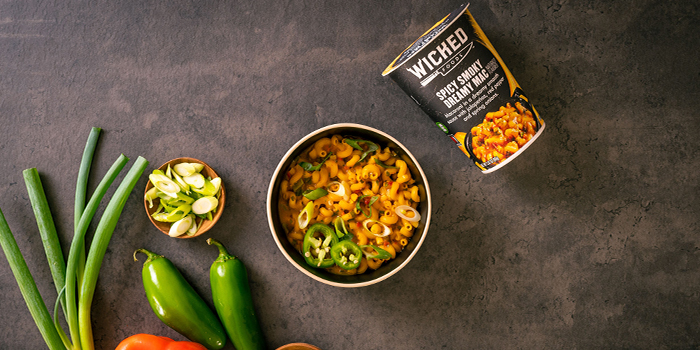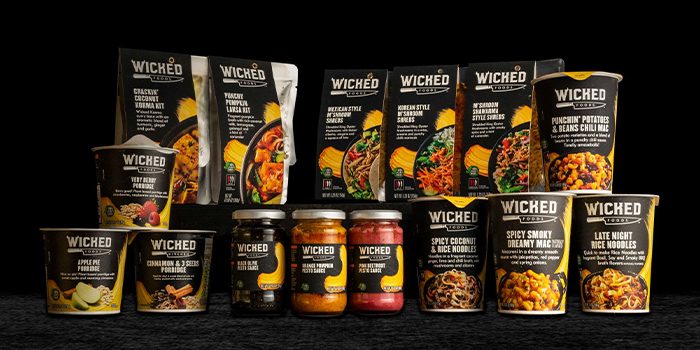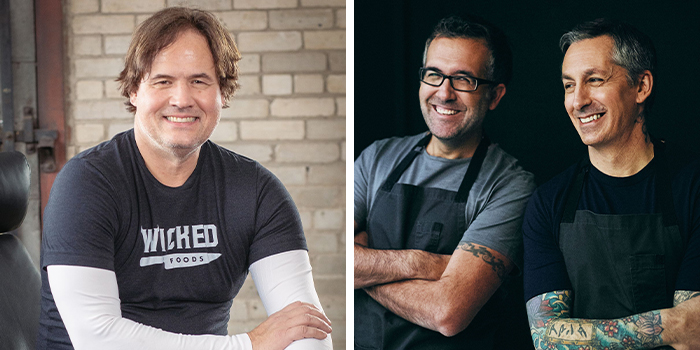Wicked Kitchen Raises $14M, Launches 20+ Items in the U.S.

After seeing success in the U.K. and bringing aboard CPG veteran Pete Speranza as CEO, plant-based food brand Wicked Kitchen announced today the closing of a $14 million funding round to fuel its global expansion.
Previously funded via angel investors and founders, Wicked Kitchen’s latest round was co-led by plant-based foods venture fund Unovis Asset Management and Thailand-based NRF Nove Foods. Unovis founding partner Chris Kerr is also a co-founder of the company, alongside chefs (and brothers) Chad and Derek Sarno.
Until this point, Wicked, launched in 2018, had been selling over 100 SKUs exclusively at retail chain Tesco. Speranza, who joined roughly ten months ago, was brought on to oversee both an expansion of its European business next year, as well as its entrance into the U.S. The company will continue to use the Wicked Kitchen brand name in the U.S., having purchased the trademark from Conagra after that company discontinued its own line of frozen meals under the same name.
Wicked is already off to a solid start with its expansion: crossing the pond earlier this month and launching in natural products retailer Sprouts.

In Tesco the brand is evenly split across ambient, refrigerated and frozen items, but in the U.S. Wicked will focus initially on frozen and ambient. The Sprouts launch consists of over 20 items spanning multiple product types, including savory meal cups, oatmeal cups, mushroom-based meat replacements, frozen meals, pestos, cooking kits and frozen meat alternatives. According to Speranza, the goal is to have a Wicked product in many of the center store categories and offer consumers plant-based options throughout the store.
“The idea is how can we work our way through the pantry so that there’s a little bit of Wicked everywhere,” Kerr said.
Other national retailers are expected to come online in the weeks to come, but the company plans to utilize a similar strategy to the U.K. by going deep with one or two retailers in every channel, rather than releasing a smaller array of products into more doors. It’s a different strategy than many other food brands, Kerr said, but one that he ultimately believes will result in faster growth and allow the company to better understand its customers.
By working closely with one or two retailers, the company can focus on filling holes in categories, hopefully resulting in deeper and longer relationships with retail buyers, Speranza said. If SKUs are not working, Kerr added, the company can easily pivot and offer branding tweaks or entirely new options.
Though the company has global ambitions, the U.S. will be a key focus for the rest of 2021, Speranza said. For now, it will try to largely utilize existing products in Tesco, though the team expects it will have to start crafting more culturally diverse options as it grows into new geographies, with Kerr describing the brand’s design as a “moveable feast.”
“You want southwest cuisine in Austin, we’ll give it to you, but if you want Gyoza dumplings in Japan, we will give you that as well,” he said. “Global adoption comes via local acceptance and local form, flavor, function and familiarity — and tradition is critical.”

The new funding will also help Wicked to build inventory; Speranza noted that the company has three different sets of products it must maintain due to different packaging requirements and product variations from country to country. To start, it is using the same co-packers across all markets and will import items as needed. To support the expansion of the business, Wicked has brought on several new employees, including 25-year General Mills veteran Adam Dill as COO.
Marketing will also be a key focus. Because the brand will only be in a limited number of retailers, Speranza said, the team can invest in targeted marketing campaigns. Though there will be investment into driving general awareness, tools such as geo-targeted digital ads and trade marketing will be key.
“At the end of the day, I want to build a global brand,” Speranza said. “But to start, the most important thing is that every person that shops the stores that we’re in, knows the brand, knows the story, and probably has tried the product in the first six months.”















